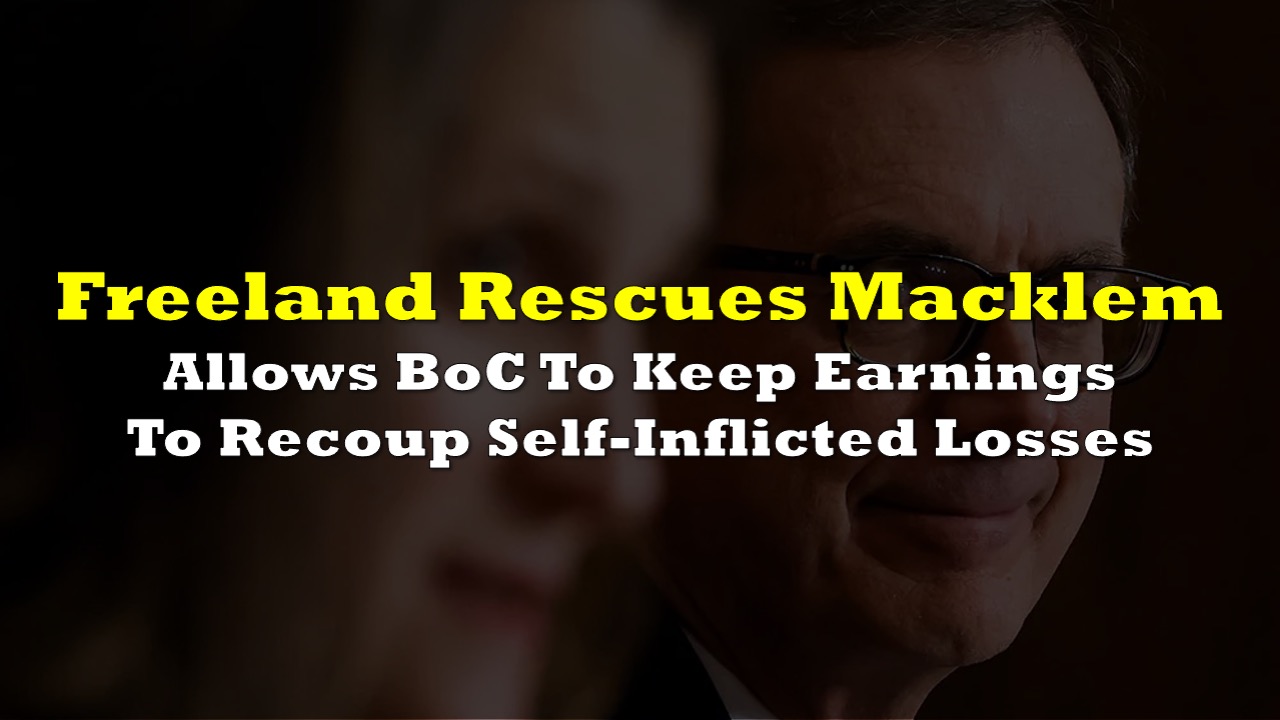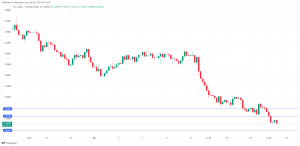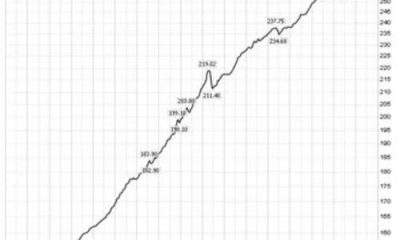Economics
Ottawa To Allow Bank Of Canada To Keep Earnings And Recoup Self-Inflicted Losses
The federal government–through Finance Minister Chrystia Freeland–is looking at legislative amendments to enable the Bank of Canada to keep revenues
The…

The federal government–through Finance Minister Chrystia Freeland–is looking at legislative amendments to enable the Bank of Canada to keep revenues in order to recoup billions of dollars in losses on the heels of its historic first of losing money.
The central bank recorded a $522 million loss in the third quarter of 2022, the first time in its nine-decade history that it has lost money. It anticipates to stay in the red for several years because it pays a greater interest rate on its liabilities, which are primarily commercial bank deposits at the central bank, than it earns on its assets, which are primarily government bonds purchased during the COVID-19 epidemic.
Tiff Macklem, Governor of the Bank of Canada, stated on Wednesday that the Department of Finance is contemplating legislative changes to address these losses.
“The minister of finance has recently communicated to me that the government intends to introduce legislative amendments that will allow the bank to retain earnings to offset losses,” Macklem said
The legislative amendments “will allow, on a temporary basis, the Bank of Canada to retain earnings rather than remit them to the government, for the purpose of covering losses,” according to Macklem. “Once positive equity is restored, we would resume our normal remittances to the Government of Canada,” he added.
Macklem makes history!
Macklem has made history as the first governor ever to report a loss at the central bank. Until last year, the Bank of Canada was always profitable, but current laws don’t give it the power to retain earnings. Instead, the bank routinely remitted its profits to the federal government, which was roughly $1 billion each year in the years preceding the outbreak.
The central bank’s huge bond-buying program, dubbed as quantitative easing, changed this during the pandemic, as Macklem was settling in to his new office. The bank purchased government bonds worth hundreds of billions of dollars in an effort to keep interest rates low and the economy afloat during the COVID-19 collapse.
The bank funded the bonds by creating settlement balances for commercial banks, which increased from roughly $250 million before the pandemic to around $390 billion in 2021.
The Bank of Canada is required to pay interest on settlement amounts at the overnight policy rate, which the Bank of Canada itself has continuously spiked to where it stands now at 4.5%, marking one of the sharpest and most aggressive tightening cycles in the bank’s history.
READ: Bank of Canada Delivers 25 Basis-Point Hike, Hints at Pausing to Assess Economic Impact
The bank estimates that cumulative losses could total $5 billion to $6 billion over the next three years, albeit this estimate is dependent on interest rate movements.
But Macklem has downplayed the issue, saying it is mostly an accounting consideration.
“None of this has any impact on monetary policy, we don’t run monetary policy with a profit motive in mind,” he said.
Trouble isn’t limited to Canada’s central bank
Adrienne Vaupshas, Freeland’s press secretary, also said that the Bank of Canada is not the only central bank in the world experiencing the situation.
“Many central banks globally – including the U.S. Federal Reserve, the Bank of England, the Reserve Bank of Australia, the Bank of Japan, and the European Central Bank – are facing similar circumstances following the extraordinary measures employed to ensure a strong economic recovery following the COVID-19 pandemic,” she said.
Information for this briefing was found via The Globe and Mail and the sources mentioned. The author has no securities or affiliations related to this organization. Not a recommendation to buy or sell. Always do additional research and consult a professional before purchasing a security. The author holds no licenses.
The post Ottawa To Allow Bank Of Canada To Keep Earnings And Recoup Self-Inflicted Losses appeared first on the deep dive.
monetary
reserve
policy
interest rates
central bank
monetary policy

Argentina Is One of the Most Regulated Countries in the World
In the coming days and weeks, we can expect further, far‐reaching reform proposals that will go through the Argentine congress.
Crypto, Crude, & Crap Stocks Rally As Yield Curve Steepens, Rate-Cut Hopes Soar
Crypto, Crude, & Crap Stocks Rally As Yield Curve Steepens, Rate-Cut Hopes Soar
A weird week of macro data – strong jobless claims but…
Fed Pivot: A Blend of Confidence and Folly
Fed Pivot: Charting a New Course in Economic Strategy Dec 22, 2023 Introduction In the dynamic world of economics, the Federal Reserve, the central bank…




















